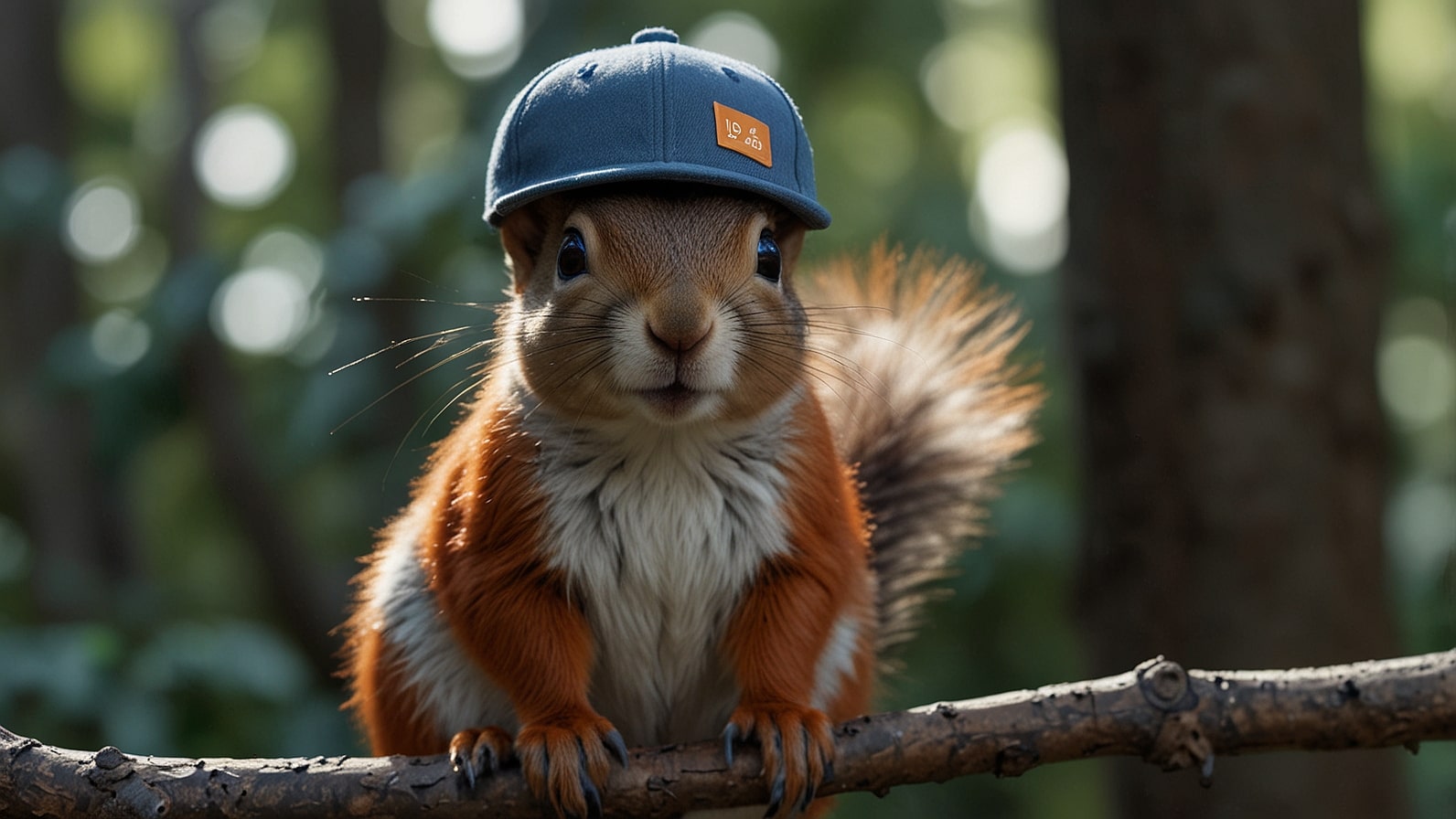
Peanuts the Squirrel Euthanized: A Tragic Tale of Regulation and Loss
The case of the popular pet and social media personality, the Squirrel Peanut, who had millions of fans on Instagram, with more than 700,000 followers, has caused a furor and resulted in many discussions after the New York authorities impounded and euthanized the animal on October 30, 2024. The squirrel, along with a raccoon named Fred, was stolen from the house of Mark Longo in Pine City, New York, following complaints about illegal possession of wildlife.
The event that led to the subsequent euthanasia of the two wild animals to determine whether they had rabies or not brings out some serious regulatory risks behind having wild animals as pets, and this has sparked off demands for change in the way such incidents are tackled. In this article, the author explores the control risks, people’s response, and the further consequences of this tear-jerking incident.
Birth of Peanut the Squirrel
Peanut’s voyage started 7 years back in New York City when a content creator, Mark Longo, found the orphaned squirrel after the same had been hit by a car, killing her mother. Peanut was unable to live in the wild when a bad injury took place to his tail, and Peanut became a permanent roommate of Longo at his home, and with time, his wife Daniela and their cat, Chloe, joined him.
Social media posts of the couple, in which they can see Peanut eating waffles, jumping through hoops, and wearing small hats, made this squirrel a worldwide sensation. They also advertised PNuts Freedom Farm Animal Sanctuary, a non-profit in Pine City, which has been featured on TV because of the social media fame of Peanut, to rescue neglected animals.
The sanctuary, established in 2023, is home to hundreds of animals, including horses, pigs, and alpacas, which incur a monthly maintenance cost of 15-20,000 pounds, with half of that revenue attributed to Peanut’s online profile. Longo had even been in the process of getting an educational animal certificate for Peanut that would have legally regularised his status. Still, this work was left unfinished due to the authorities’ abrupt action.
Regulatory Risks: Wildlife Laws and Public Health
The main regulatory risk associated with the Peanut case is that keeping wild animals as pets, especially without a license, may be strictly prohibited. The Department of Environmental Conservation (DEC) in New York has laws that compel every holder of wild animals in their possession to have a licence to keep them on the grounds of risks due to disease infections like rabies.
After several anonymous tips against Peanut and Fred, the DEC, led by at least six officers, broke into Longo’s house on 30 October 2024 and spent five hours searching the premises. According to the agency, the seizure was because living in the proximity of wild animals is a “potential human exposure to rabies,” especially when, according to the agency, Peanut allegedly bit an officer amid the investigation.
Peanut and Fred were both put down to test for rabies since the process needs brain cell samples, according to the recommendations of the Centers for Disease Control and Prevention (CDC). By 12 November 2024, Chemung County Executive Chris Moss made clear that the two animals were rabies-free, prompting further criticism of the DEC’s actions.
Longo, who said he did not see the suspected bite, termed the raid as heavy-handed, and he claimed that an alternative might have been quarantine instead of immediate euthanasia. The absence of transparency and due process in the treatment of the case by the DEC is a significant indication of one of the principal regulatory risks, as the balance between the concerns of animal welfare and the safety of people lacks clear guidelines.
Public Outcry and Political Backlash
The euthanasia of Peanut and Fred sparked a criticism firestorm as over 28,000 signatures were gathered on a Change.org petition, and a GoFundMe was raising approaching C 6,000 to file legal action to continue the legacy of Peanut rather than have her killed. Other figures in the public domain, such as Congressman Nick Langworthy and Vice President-elect JD Vance, criticized the DEC, citing it as improperly prioritizing resources.
Langworthy claimed that the agency has to concentrate on vital matters, such as flood mitigation, as opposed to capturing pet squirrels. The uproar even attracted former president Donald Trump, who, according to Vance, was fired up with the death of Peanut and politicized the occurrence, adding to his 2024 presidential run in the US.
Social media increased the outrage, since users such as @LadyFreethinker demanded that protections be granted to the sanctuary animals and that the euthanasia was labeled as madness by users @archwaydefense. The Police Benevolent Association of New York State reported that bomb threats were placed at DEC facilities, which indicated the height of the population’s opinion. The emotional Instagram posts made by Longo, including a tearful video, stated that Peanut had been the best thing that had happened to him and his wife, further uniting support.
Legislative Response: Peanut’s Law
Responding to this, New York State Assemblyman Jake Blumencranz introduced a bill dubbed the Peanuts Law (Jake Blumencranz 2024), which was offered on 4 November 2024 to amend the Environmental Conservation Law.
The bill would propose a 72-hour waiting period to euthanize sanctuary animals, and this would create a DEC review board that would allow the process of emergency appeals. The present legislative initiative outlines the more general issue of regulatory risk, such as obsolete and rigid wildlife legislation that overlooks animals within the sanctuary or animals that are unsuitable to enter the wild.
Animal Sanctuaries and Crypto Ventures Implications
The Peanut saga is also on a collision course with the widely fluctuating cryptocurrency. In the aftermath of his death, unofficial coin memes pegged as $PNUT and $FRED meme rose to a market cap of 80 million pounds, preying on the tragedy and not even helping Longo and his sanctuary.
On 23 July 2025, X, @Kick_Cryptowski posted that there was the introduction of real tokens released through a collaboration with Longo in favor of P, which was published on X, and this shows why there should be some laws to govern the use of crypto, since there will be profiteering in such a situation.
Moving Forward
The euthanasia of the squirrel named Peanut highlights the conflict between wildlife protection policies and the emotional bonds people form with animals they rescue. Licensing is again a big issue for both the sanctuaries and the pet industries, with failure to abide by this resulting in disastrous consequences.
The citizens are faced with a conundrum, as Longo explained to NewsNation: the town has money to kill a squirrel and a raccoon, but it cannot fix the big bridges anywhere near where I am standing. The increased popularity of his appeal to justice shows that people and politicians want more humane and transparent administrative forms of government.
To sum it up, the compliance issue of euthanasia of Peanut the Squirrel (under harsh wildlife regulations, due process, and health-related regulations) has been the genesis of forces to reform. Peanut can be seen in the PNuts Freedom Farm, which carries his legacy, and also in suggested reforms such as Peanuts Law, which reminds us that compassion and regulation should go hand in hand so that the criminal can be labeled a criminal and the good ones remain so.



 Bitcoin
Bitcoin  Ethereum
Ethereum  Tether
Tether  XRP
XRP  USDC
USDC  Wrapped SOL
Wrapped SOL  TRON
TRON  Lido Staked Ether
Lido Staked Ether  Cardano
Cardano  Avalanche
Avalanche  Toncoin
Toncoin